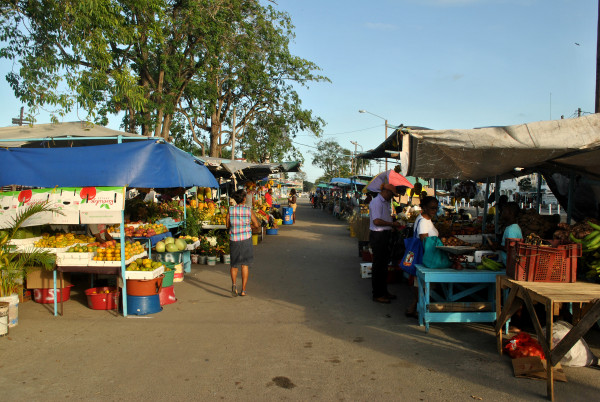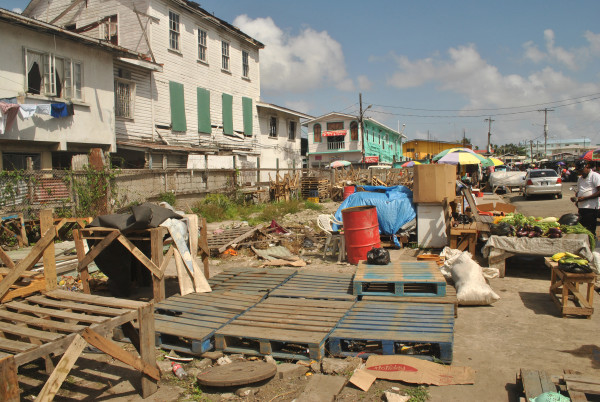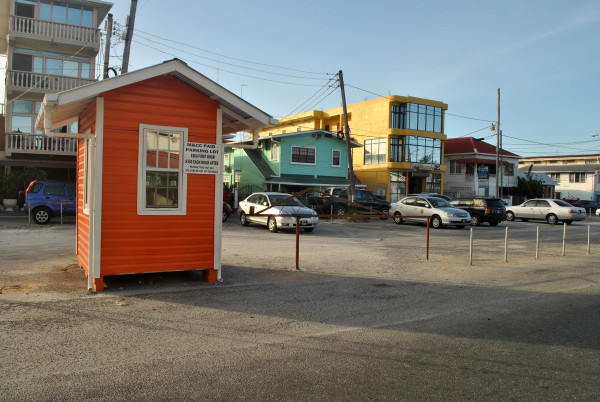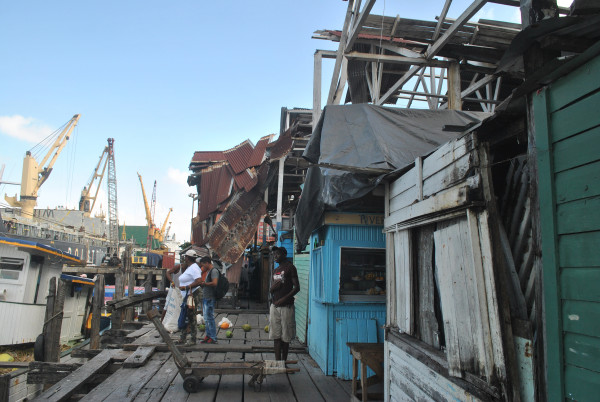Long deprived of anything even remotely resembling a convivial environment in which to ply their trade in the conditions afforded by the dilapidated wharf at the western extreme of the Stabroek Market, the dozens of long-suffering vendors are to benefit from a new multi- million trading facility.

This newspaper has been told that the now collapsed section of the Stabroek Wharf on which the vendors once traded will be restored and there will be a complete makeover to include an entertainment area boasting eating houses and a recreation area.
Work on the creation of the new trading area, City Hall Public Relations Officer Debra Lewis has told Stabroek Business will begin in March and the cost of the facility will be shared by the municipality and the Ministry of Public Works.
The first meaningful official response since the collapse of a section of the wharf in March last year displaced more than 200 vendors has elicited a less than euphoric response from the vendors who must now wait out an unknown period in the less than ideal conditions offered by the Georgetown Stelling, where they have been located.
These, however, are trying times for vendors. Some of them have told this newspaper that they believe that the importance of them earning a livelihood is gradually being subsumed beneath the prevailing emphasis of ‘restoring the capital.” It is, one vendor suggested, a matter of the livelihoods of market vendors being sacrificed on the altar of the municipality’s reputation.
Having been given a further two weeks to relocate from the area where work is due to start in a matter of weeks some of the vendors have simply not budged. Lewis says that their posture is more than a matter of seeking to defy authority. Life has been tough this past year and, Lewis told Stabroek Business, City Hall is aware that the vendors will need to meet the cost of removing their stalls to the temporary location.
It is, too, as far as the Stabroek Business has determined, a matter of trust. If assurances have been provided that the displaced vendors will be allowed to return once the repairs and rehabilitation have been completed, the vendors say they are skeptical. Some of them point to the precedent of the Bourda Market vendors removed from their vending locations near the site of the now demolished Bedford school. There was a point in time when they too had been told that they would be allowed to return.
In the case of the Stabroek vendors, City Hall has already dropped a broad hint that they will have to pay a higher fee to trade in the promised improved environment. Some have already said that they doubt that they can afford a higher fee.
Frenetic attempt
If City Hall isn’t saying so, its frenetic attempt to “restore the capital” is clearly an effort to try to salvage at least a modicum of pride – lost over a number of years of indifference, incompetence and squabbles with the previous political administration – ahead of the forthcoming Local Government Elections. It shows in the diligence with which, these days, the municipality is going about its salvaging operation and in its preparedness to cross swords with urban vendors whose trading practices, it says, have been part of the problem.
Repairing and renovating the five badly run-down municipal markets – Stabroek, Bourda, Kitty, La Penitence and East La Penitence/East Ruimveldt – are, Lewis says, a priority. Work has already started on the East La Penitence Market and this newspaper understands that a decision is yet to be made as to whether the Kitty Market can be salvaged or whether a completely new structure will be required.
City Hall, meanwhile, says it is determined to “restore order” in the capital, a task which, it would seem, includes addressing issues of street vending.
Lewis points to Cap Part 1 of 28:01 of the Municipal and District Councils Act which declares that “no person shall leave, place or store, or cause to be left placed or stored, any vehicle, cart , dray, barrel, box, dust bin-bin or tree trunk, branch, limb, or any other thing upon any street, parapet or pavement, with any vehicle, cart, dray, barrel, box, dust bin, or other thing” and which gives the City Engineer the power “to remove any such vehicle, cart, dray, barrel, box, dust-bin, tree trunk, branch, limb, or other thing whatsoever, left, placed or stored contrary to paragraph (1)” and to require the Town Clerk to recover the cost of such removal. It is a regulation which the municipality believes it has to enforce vigorously if it is to make any headway in cleaning up Georgetown.
But there are other challenges. For years the illegal vending which has ensued on parapets in the city has been ignored by the Council. Now that the move to bring a measure of order to the capital appears to be in full swing, simply evicting the scores of vendors whose economic lives have long been shaped by that activity is not an option. Lewis says that the municipality is not unmindful of this and that it has embarked on locating vacant buildings and convenient open spaces that it can acquire to accommodate the approximately 457 registered vendors scattered across parts of the city on parapets and reserves; all this when (much to the discomfort of City Hall) the urban vending population would appear to be growing. That would appear to be a matter which, in the future, might give rise to litigation.
Bearing fruit
Across the way on Merriman Mall it would appear that vending will be normalised in a short while. City Hall would appear to be satisfied that its efforts to bring a measure of order to the location are bearing fruit. Amenities including lighting, water, washrooms and security are being added and Lewis says that the Council is keen to dispel the notion that appears to have grown amongst the vendors that the whole idea is to reduce if not remove altogether their trading spaces. What will change, she says, is what, currently, is the inequality in the allocation of trading space. Stalls will be provided by the Council.
To keep the vendors in check, Lewis says, the Council intends to declare a ‘riot act’ on lawlessness….like the dumping of discarded fruit, vegetables and other remains of the trading day in the canals that border the trading area and on parts of the trading area itself. The facility of vendors being allowed to trade in that area from Thursday to Saturday, only, will also be rigidly enforced.
There are other areas, too, in which City Hall will be reaching for the regulations to enforce change. Council, Lewis says, has become increasingly concerned over the mushrooming of ‘barber shops’ and cosmetology services on pavements and other spaces in downtown Georgetown. She cites Part 11 of 28:01 of the Municipal and District Councils Act which declares that ‘no person shall act as a barber in or upon any public street or way or at any place within public view other than at a duly registered barber’s shop.’ Among other things, City Hall is treating the offering of such services on the public byways as a safety and health transgression since it says requisites such as running water are not available at those facilities. Those wayside facilities will all have to go whilst eight Environmental Officers currently being trained by the Ministry of Health will be inspecting Barber Shops and Salons to ensure that safety and health protocols are observed. Health and sanitation-related inspections will also be extended to other business houses to ensure the proper disposal of garbage whilst residential inspections will also be enforced to ensure that bins and surface drains are in place.
Traffic congestion
Managing what has now become an untenable state of affairs insofar as traffic congestion is concerned is one of City Hall’s biggest headaches. Vehicle parking has become a nightmare, so much so that City Hall, according to Lewis, is mulling a policy that requires every new building created for commercial purposes to provide its own parking space. The Council, Lewis says, is also seeking to create and operate its own limited number of free and paid parking spaces in the capital. In the shorter term, this newspaper understands, two free parking facilities – one in Bourda and another in Cummingsburg – will be opened.
The more elaborate plans for the city, Lewis says, includes the retrieval and preparation of space for urban recreation. Some spaces have already been reclaimed, including areas on the Merriman Mall and in Roxanne Burnham Gardens for the creation of outdoor sports facilities and a Community Centre-type facility.
City Hall, meanwhile, Lewis says, is seeking to build new and sturdier bridges with the urban vendor community. That relationship, she believes, is already growing out of the vendors’ positive response to the municipality’s urging that they keep their trading spaces clean. The Council too, Lewis told Stabroek Business, is conscious of the need for it to keep its own promises to the vendors if a positive relationship is to be maintained. A meeting with the vendors was scheduled for Wednesday January 13, 2016 in the compound of the City to hear their concerns and to brief them on City Hall’s unfolding plans for the capital. For the time being, however, some things are unlikely to change. The dozen vendors recently removed from Bourda Street close to the now demolished Bedford school will not now be restored to the location as originally promised. The owner of the now empty lot has secured an injunction restraining the vendors from trading in the area. City Hall, it appears, is treating that particular matter as a casualty in a bigger campaign to restore the Garden City to its former glory.











